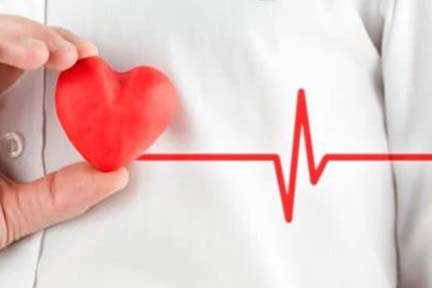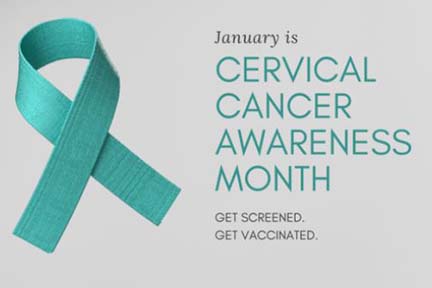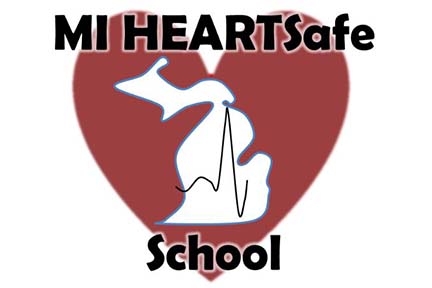
by orionontv | Feb 15, 2023 | Health and Wellness
|
Press Release
FOR IMMEDIATE RELEASE: Feb. 15, 2023
CONTACT: Chelsea Wuth, 517-241-2112, [email protected]
MDHHS observes American Heart Month this February
Implementing tools and techniques can lower risk
LANSING, Mich. – Heart disease is the leading cause of death of women in the United States and in Michigan, causing about one in five deaths in 2020. In recognition of American Heart Month and the American Heart Association’s Go Red™ for Women campaign, the Michigan Department of Health and Human Services (MDHHS) WISEWOMAN program and Heart Disease and Stroke Prevention Unit are working together to raise awareness of heart health.
“The best way to protect against heart disease is to prioritize heart health by developing and maintaining healthy habits,” said Dr. Natasha Bagdasarian, MDHHS chief medical executive. “Michigan residents can do this by being aware of their individual risk factors and leading a heart-healthy lifestyle, which includes seeing their doctor for routine visits, not smoking, eating a healthy diet and getting regular exercise.”
Between 2019 and 2020, mortality rates due to heart disease increased nearly 2% among white non-Hispanic women, more than 8% among Hispanic women and nearly 10% among Black non-Hispanic women ages 25 and older nationwide. Although women are disproportionately impacted, heart disease can affect people of any age, gender, race or ethnicity.
Most cardiovascular diseases can be prevented by implementing lifestyle changes, including:
- Not smoking and avoiding exposure to secondhand smoke.
- Engaging in regular physical
- Eating a balanced diet.
- Managing healthy blood pressure, blood sugar and cholesterol levels.
- Achieving and maintaining a healthy weight.
Both the WISEWOMAN program and the Heart Disease and Stroke Prevention Unit work to increase awareness of the risk factors for heart disease, high blood pressure and stroke through the work of the Michigan Million Hearts® Network. Million Hearts® 2027 — a national initiative to prevent 1 million heart attacks and strokes co-led by the Centers for Disease Control and Prevention (CDC) and the Centers for Medicare and Medicaid Services. The Million Hearts Initiative collaborated with the CDC Foundation to develop the “Live to the Beat” campaign.
Women should talk with their health care providers about their health including any risk factors they may have for cardiovascular disease. For information on risk factors as well as signs and symptoms of cardiovascular disease, visit Go Red for Women. For more information about the WISEWOMAN program, call 844-446-8727. |

by orionontv | Jan 30, 2023 | Health and Wellness

FOR IMMEDIATE RELEASE: Jan. 27, 2023
MEDIA CONTACT: Bob Wheaton, 517-241-2112, WheatonB@michigan.gov
Extra COVID-19 emergency food assistance payments ending after February due to recent federal legislation
Other help is available for people affected by the change
LANSING, Mich. – Families who receive food assistance through the Supplemental Nutrition Assistance Program (SNAP) should prepare for the end of the increase in benefits that have helped address food insecurity during the COVID-19 pandemic due to recent federal legislation.
February will be the last month that people in Michigan and other states receive the extra food assistance benefits – which have been at least $95 more per month. In March the additional benefits will no longer be issued.
People who receive food assistance should prepare and seek needed resources to accommodate this reduction in their benefits. Among the options are food banks and other agencies in their local communities, which can be found at www.michigan.gov/MIBridges under the “Explore Resources” tab or by calling 2-1-1.
People affected by the upcoming changes can also find help on this website, which includes information about resources such as local food banks, free and reduced-price school lunches, the WIC program for women and babies, and Double Up Food Bucks – which provides $1 in Double Up Food Bucks for every $1 (up to $20 per day) that Bridge Card users spend on fresh fruits and vegetables purchased from participating retailers.
For family budgeting purposes, SNAP benefits are available to use for nine months once they are issued.
“Approximately 1.3 million Michiganders have received additional food assistance monthly during the pandemic to help them put food on the table in challenging times,” said Lewis Roubal, Michigan Department of Health and Human Services (MDHHS) chief deputy director for opportunity. “We appreciate the support from our federal partners. Now that we know the additional benefits will be going away, we want to make sure our clients are prepared for this change, as we realize inflation is affecting all of us.”
The additional food assistance was ended in the federal Consolidated Appropriations Act of 2023 that was signed Dec. 29, 2022.
To address the effects of the newly emerged COVID pandemic, in April 2020, some Michigan residents began getting additional food assistance. In May 2021, all eligible households began getting these extra monthly benefits. Michiganders have been receiving the extra food assistance in a separate, second issuance that occurs near the middle or end of each month.
The second payments bring all households to the maximum monthly payment for their group size. Anyone who was already receiving the maximum amount has been receiving an extra $95 per month.
Regular benefit amounts are based on household size, income and deductions. The amount of the decrease will vary based on each group’s circumstances. As an example, single-person households with a net monthly income of $700 could see their total monthly SNAP benefit drop from $281 to $71. A four-person household with a net income of $1,700 could see their assistance drop from $939 to $429.
Michiganders who receive food assistance can check their regular monthly food assistance amount on their Michigan Bridge Card by going online to www.michigan.gov/MIBridges or calling 844-464-3447. Or they can go the ebtEDGE portal or call 888-678-8914 to check their remaining balance available to spend on food. Customer service is available 24 hours a day, seven days a week. Spanish and Arabic service is available. If you are deaf, deafblind, or hard of hearing or speech-impaired, call the Michigan Relay Center at 7-1-1.
More information about the how benefits connected to the COVID-19 Public Health Emergency are changing can be found at Michigan.gov/2023BenefitChanges and details about the SNAP changes can be found on the Food Assistance Program webpage.

by orionontv | Jan 26, 2023 | Health and Wellness
|
Press Release
FOR IMMEDIATE RELEASE: Jan. 26, 2023
CONTACT: Lynn Sutfin, 517-241-2112, SutfinL1@michigan.gov
MDHHS seeking proposals for Child and Adolescent
Health Center Program Implementation
LANSING, Mich. – The Michigan Department of Health and Human Services (MDHHS) is requesting proposals to expand the Child and Adolescent Health Center program through school-based or school-linked health services. The models funded through this grant include Child and Adolescent Health Centers (CAHC) and School Wellness Programs (SWP).
The Child and Adolescent Health Center Program provides a safe and caring place for children and adolescents to learn positive health behaviors, prevent diseases and receive needed medical care and support. Clinical CAHC and SWP program models assist eligible children and adolescents with enrollment in Medicaid and provide access to Medicaid preventive services.
The Request for Proposal (RFP) is open to public and non-profit entities such as local health departments, community health centers, community mental health agencies, federally qualified health centers, non-profit hospitals/health systems, school districts, federally recognized tribes and other health care or social service organizations qualified to provide school-based or school-linked health care services. Applicants must demonstrate collaboration between the local school district, health care providers and sponsoring agencies in the application.
The five-month award begins May 1 and ends Sept. 30, 2023. There is $12.1 million available, with maximum awards of $330,000 and minimum awards of $170,000. Successful applicants will be invited to apply for annual renewals based on availability of funds and acceptable performance. The funding was part of a $25 million investment made by Gov. Gretchen Whitmer last year to expand this successful program to additional sites across the state.
A pre-application conference will be held to discuss this funding opportunity and provide instruction on using the EGrAMS system on Wednesday, Feb. 1, at 1 p.m. The conference will last approximately 90 minutes and can be accessed at https://bit.ly/3Qz1Syy.
Grant applications for the Child and Adolescent Health Center Program Implementation RFP must be submitted electronically through EGrAMS by 3 p.m., March 1.
For more information or to apply, visit the EGrAMS website and select “About EGrAMS” link in the left panel to access the “Competitive Application Instructions” training manual. The complete RFP can be accessed under the ‘Current Grants’ section under the “Public Health Administration” link and selecting the “CAHIP-2023” grant program. |

by orionontv | Jan 16, 2023 | Health and Wellness
|
Press Release
FOR IMMEDIATE RELEASE: Jan. 12, 2023
CONTACT: Lynn Sutfin, 517-241-2112, SutfinL1@michigan.gov
Michigan releases new fish consumption guidelines
for rainbow smelt and carp caught in various lakes
LANSING, Mich.- The Michigan Department of Health and Human Services (MDHHS) has released new Eat Safe Fish guidelines for rainbow smelt and carp from seven different lakes across the state.
The updated Eat Safe Fish guidelines recommend limiting the consumption of certain locally caught smelt and carp based on levels of chemicals found in the commonly eaten parts of the fish.
The new rainbow smelt guidelines are based on elevated levels of perfluorooctane sulfonate (PFOS) found in the smelt. PFOS is a chemical in the family of per- and polyfluoroalkyl substances (PFAS) and can build up in fish and in people who eat these fish.
The new Eat Safe Fish consumption guidelines for rainbow smelt are as follows:
- Lake Huron: 6 servings per year.
- Lake Michigan: 1 serving per month.
- Portage Lake in Houghton County: 1 serving per month.
- Gull Lake in Kalamazoo County: 2 servings per month.
- Higgins Lake in Roscommon County: 4 servings per month.
MDHHS currently recommends that no one eat more than 1 serving per month of rainbow smelt from Lake Superior due to elevated levels of PFOS.
MDHHS is also releasing two new guidelines for carp based on elevated levels of polychlorinated biphenyls (PCBs). Like PFOS, PCBs take a very long time to break down in the environment and can build up in fish and in people who eat these fish.
The new Eat Safe Fish consumption guidelines for carp are as follows:
- Thompson Lake in Livingston County: Do Not Eat
- This means everyone should avoid eating carp from Thompson Lake.
- Earl Lake in Livingston County: Limited
- This means individuals under age 15, those with health problems such as cancer or diabetes and those who might have children in the next several years, are pregnant or are breastfeeding should avoid eating carp from Earl Lake. All other individuals should limit their consumption of carp from Earl Lake to one or two servings per year.
These new guidelines and others previously published in the MDHHS Eat Safe Fish Guides for lakes and rivers statewide can help Michiganders find safer fish to eat and reduce exposure to chemicals that can cause harmful health effects.
The Eat Safe Fish Guides are currently being updated for 2023 and will include these new carp and smelt guidelines along with others pending analysis. To view the regional 2022 Eat Safe Fish Guides, visit Michigan.gov/EatSafeFish and click on “Find Your Area.”
It is important to note that fish from some areas in Michigan are more contaminated than others. By using the Eat Safe Fish Guide, Michigan fish consumers can be confident they are making informed choices about eating the fish they catch from their local lake or river. Eat Safe Fish guidelines are not laws or regulations, and no one is required to follow them.
For more information on where to find, prepare, eat or buy safe fish, visit Michigan.gov/EatSafeFish or call MDHHS Division of Environmental Health Hotline at 800-648-6942.
# # # |

by orionontv | Jan 10, 2023 | Health and Wellness
|
Press Release
FOR IMMEDIATE RELEASE: Jan. 10, 2023
CONTACT: Lynn Sutfin, 517-241-2112, SutfinL1@michigan.gov
MDHHS urges Michigan residents to get screened
as part of Cervical Cancer Awareness Month
LANSING, Mich. – At the start of the New Year, many people make resolutions and begin routines to improve their health. As January is Cervical Cancer Awareness month, the Michigan Department of Health and Human Services (MDHHS) is urging Michiganders to make a resolution to be regularly screened for cancer. By staying current on cervical cancer screening, people could improve their health in 2023, and prevent cervical cancer in the future.
In Michigan, the rates of new cervical cancer cases and deaths due to cervical cancer have remained relatively low but steady since 2011. Approximately 75% of cervical cancer diagnoses and 60% of cervical cancer deaths statewide occur among women ages 30-64. Furthermore, Black non-Hispanic residents experience significantly higher rates of late-stage cervical cancers and cervical cancer deaths than white non-Hispanic residents.
“In its early stages, cervical cancer may not cause any symptoms,” said Dr. Bagdasarian, MDHHS chief medical executive. “Routine cervical cancer screening is the most effective way to detect cervical cancer early, when it is most treatable, and the first step is talking with your health care provider.”
Screening for cervical cancer is recommended to begin at age 21 and as follows:
Women ages 21 to 29:
- Pap Smear every three years.
Women ages 30 to 65: (one of the following options)
- Pap Smear every three years OR
- A laboratory test for high-risk human papillomavirus infection (HPV) every five years OR
- A Pap Smear and HPV co-test every five
MDHHS has openings for program-eligible individuals to receive free cancer and health screenings through two of its programs.
- The Breast and Cervical Cancer Control Navigation Program (BC3NP), available statewide, provides free breast and cervical cancer screening services to low- income women. This may include follow-up care if a screening abnormality is Although the BC3NP does not pay for cancer treatment, women diagnosed with breast or cervical cancer may be eligible for a special Medicaid program that provides cancer treatment.
- The WISEWOMAN Program, available in select areas of the state, helps participants understand their chronic disease risk factors and make healthy lifestyle Every participant receives a free health screening. A health professional will review the results of the health screening, and the participant will have the opportunity to work with a health coach. In addition, participants can choose to participate in a number of free support services, such as the Diabetes Prevention Program, Weight Watchers, Take off Pounds Sensibly or Cooking Matters.
To learn more about Michigan’s Breast and Cervical Cancer Control Navigation Program and the WISEWOMAN Program, call 844-446-8727 or visit Michigan.gov/cancer. For Spanish resources, call 800-379-1057. |

by orionontv | Jan 10, 2023 | Health and Wellness
|
Press Release
FOR IMMEDIATE RELEASE: Jan. 10, 2023
CONTACT: Chelsea Wuth, 517-241-2112, [email protected]
MI HEART Safe School Program advocates for medical emergency preparation
LANSING, Mich. – In Michigan, the MI HEARTSafe School Program was developed to prepare school facilities to respond to cardiac emergencies. Fast-acting cardiopulmonary resuscitation (CPR) and access to an automated external defibrillator (AED) prior to emergency medical services (EMS) arrival is critical for best possible outcomes.
By recognizing the signs of a sudden cardiac arrest and responding quickly by calling 911 and using CPR and AED before EMS arrives, schools can support a safer environment for students, staff and their communities. A virtual workshop Tuesday, Jan. 24 will be held to teach schools about the program requirements, importance of cardiac emergency preparedness, and the available tools and resources to help them achieve the criteria.
Sudden cardiac death claims the lives of approximately 250 Michigan children and young adults under the age of 40 annually. The MI HEARTSafe School Program, supported by the Michigan Department of Health and Human Services (MDHHS), Michigan Department of Education (MDE), American Heart Association, Michigan High School Athletic Association (MHSAA) and Michigan Alliance for Prevention of Sudden Cardiac Death of the Young (MAP-SCDY), has certified 713 schools in its nine-year history, and expanding the awareness of the program to rural areas and at-risk populations is needed to ensure all Michigan schools are ready in the event of a sudden cardiac emergency.
“Preparation is key to ensuring positive outcomes during cardiac emergencies,” said Dr. Natasha Bagdasarian, MDHHS chief medical executive. “Swift action paired with access to life-saving equipment and training saves lives. Having schools trained for cardiac emergencies can help decrease the number of tragedies and prepare school employees to respond in a timely manner and avert what could be a life-threatening situation. We encourage all schools to apply for a HEARTSafe certification.”
If schools want to learn more about how to prepare for these emergencies, MAP-SCDY will be hosting the Jan. 24 virtual workshop from 10 a.m. to noon. Registration is required.
Requirements to become a MI HEARTSafe School include:
- A written medical emergency response plan and team that can respond to an emergency during school hours and after-school activities and sports.
- Current CPR/AED certification of at least 10% of staff and 50% of coaches, including 100% of head varsity coaches and physical education staff.
- Accessible, properly maintained and inspected AEDs with signs identifying locations.
- Annual cardiac emergency response drills.
- Pre-participation sports screening of all student athletes using the current physical and history form endorsed by MHSAA.
Resources to help meet the criteria are available on the MI HEARTSafe School website. Schools meeting these requirements are able to apply for the MI HEARTSafe School Award and the application cycle is open from January through May 15, 2023.
For more information about the MI HEARTSafe Schools program, visit Migrc.org/miheartsafe or email MDHHS-MI-HEARTSafe@michigan.gov.
For resources in obtaining an AED, click here. |







